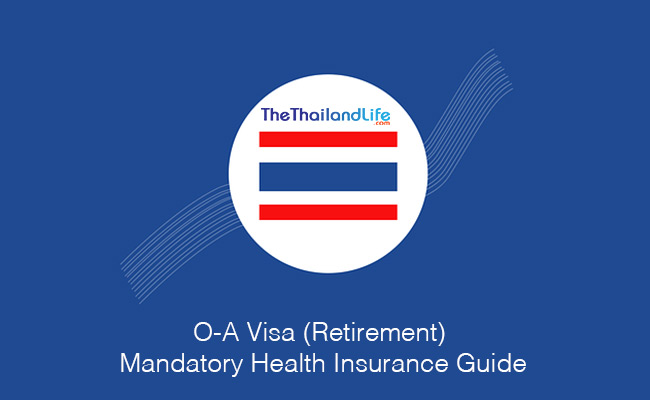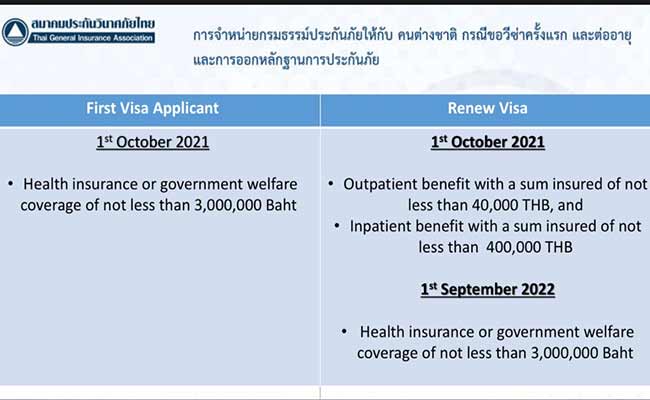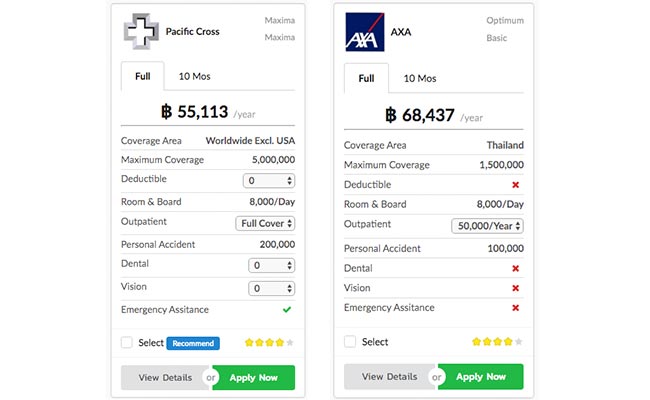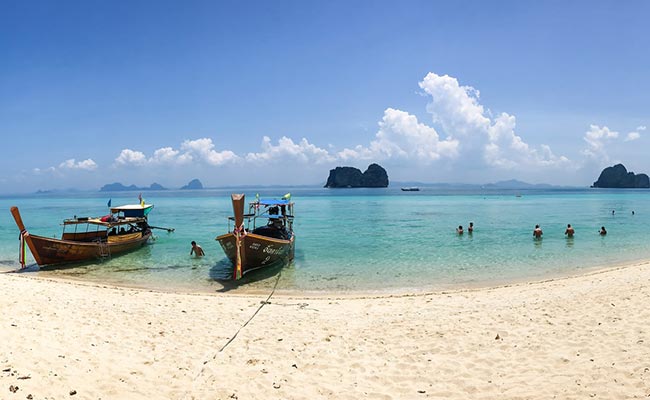If you've got questions about the mandatory retirement visa health insurance requirement (O-A visa), this FAQ will answer those questions, and much more.
Please also note that as of late 2021, the requirement has been extended (in some countries) to those applying for a Non Immigrant O Visa too. More on that later on.
In this post I'll cover the following:
- Why you need health insurance.
- Who the approved companies are.
- How much you can expect to pay.
- How to get it cheaper than advertised.
- And how you can avoid this requirement altogether!

What is an O-A (Retirement) Visa?
The O-A is commonly known as a ‘retirement visa', though there isn't officially a visa called the ‘retirement visa'.
It is for those aged 50+ who want to stay in Thailand for a period of 1 year, without the intention of working. You can extend after the year is up, provided you meet the financial requirements.
The O-A is obtained in your home country and, when you enter Thailand, you are stamped in for a year.
The new mandatory health insurance rule applies to both new Non-Immigrant O-A visa applicants and current Non-Immigrant O-A visa holders who obtained the visa after the enforcement date.
What other visas are affected by this rule?
As of August 2021, some embassies now require this health insurance for those applying for a Non O Immigrant Visa.
I expect this to be rolled out across the board, but currently the requirement is active in Japan, some US states, and some European countries. The UK is not yet affected.
The reason for this has not been announced, but it is most likely to bring the O and O-A retirement pathways into line.
Previously, those applying for the O Visa and then doing a retirement extension in Thailand could avoid this health insurance requirement, whereas those going down the O-A Visa retirement route needed to get their year's worth of insurance in their home country before flying.
Bear in mind that the Non Immigrant O Visa is issued for 90 days (single entry), so the insurance needs only cover this duration. The O-A Visa is issued for a year, so the insurance policy needs to cover this period.
Holders of the Non-Immigrant O-X visa have needed mandatory insurance since 2017. No other visas require this mandatory health insurance.
Why introduce mandatory health insurance?
Back in May 2019, a representative of the International Health Division (Health Service Support Department), stated that in 2017 and 2018, foreigners incurred non-paid medical bills amounting to 349 million Baht, and 305 million Baht, respectively.
The records show that in 2017, 565,000 out of 3.3 million visitors didn't pay their medical bills. In 2018, the figure rose to 680,000 out of 3.42 million visitors.
They say the majority of unpaid bills were from retirees on long-stay visas.
I'm not convinced of that, but what is true is that those 50+ years old are more likely to develop long-term illness. The bill for heart disease, cancer, type-2 diabetes complications, etc., can be a very expensive one.
But don't most expats have insurance anyway?
You would think so. Most I meet do. Furthermore, the majority of stories in the papers surrounding unpaid medical bills are usually regarding tourists in motorbike accidents.
A better solution might have been:
- A. charging a 500 Baht entry fee to each person entering the country (per year) – this would have covered the cost of unpaid bills cited by the health department.
- B. making sure everyone who enters the country has medical insurance!
But we are where we are now. Let's move on.
How much cover do I need?
Currently, for those that are already in Thailand on an O-A visa, the requirement remains at the old rate of 400,000 in patient and 40,000 of out patient coverage. You can still extend your current visa inside Thailand on this requirement.

Where do I get my retirement visa health insurance?
Those in charge have come up with an approved list of local insurance providers:
The companies are as follows:
- Thai Health Insurance
- LMG
- The Viriyah
- Pacific Cross
- Falcon
- Thaivivat
- AXA
- Navakij
- Dhipaya
- Asia Insurance
- Aetna
- Sompo Insurance
You have to use one of these providers and present your premium with your visa application. The premium must meet the minimum requirements.
How much are the premiums?
Reasonable, I guess, depending on your exchange rate, and if the insurance cover is solely for Thailand.
Once you get to 60+ years it starts to get expensive. And if you want regional or international cover the price rockets.
I've had a fair few emails from disgruntled readers. Here's one that explains how restrictive this new rule can be for those over 65 and 70:
4 carriers on the Thailand Long Term Insurance website will insure me at 70 years or older. For me at age 71, the rates range from 69,000 to 81,000 Baht per year. This is prior to an exam and underwriting and subject to change.
The rates are almost double what a 65 year old pays. At 75 years they increase 33% and at 80 66%, respectively.
So only 4 out of the 7 will actually insure those who are 70+. And for those 80+, there are no options.
Indeed, Thaivivat Insurance goes highest in terms of age. They will insure you at 76 years old, with renewals up to 100 years old – starting at 120,000 Baht.
Is there a cheaper option?
Yes. I found that if you use the Mister Prakan site you can can shave a bit off the premiums.
This site covers numerous companies and five on the approved O-A visa list:
- AXA
- Pacific Cross
- LMG
- Viriyah
- Thaivivat
So you can get cover from one of those approved providers and save money on going through the government website.
Here's a couple of quotes I got based on being 50 years old and exceeding the 40k outpatient and 400k inpatient cover. I'm 41 but to be eligible for an O-A visa you have to be 50.

+ Click here for quotes on the Mister Prakan site
I don't want this insurance/have my own, what can I do?
Don't get an O-A visa.
But I want to retire in Thailand, is there another way?
Yes. Get a Non Immigrant O Visa. You don't need the mandatory health insurance for this visa, unless you are living in one of the aforementioned countries that are now asking for this cover as part of the application process.
Still, even if you do require it, you only need 90 day's worth of coverage.
How is a Non Immigrant O Visa different from the O-A?
An ‘O' category visa can be issued for a range of purposes such as visiting family or friends in Thailand, taking a voluntary job, getting medical treatment, attending a judicial process, and even to work as diplomat's housekeeper.
It can also be issued for the purpose of retirement. Good news.
Where retirement is concerned, you can obtain a single entry Non Immigrant O Visa from your home country, or neighboring country to Thailand, which gives you entry to Thailand for 90 days.
After 60 days in Thailand, you can apply for a 1-year extension at an immigration office – providing you meet the financial requirements, as stipulated in my retirement visa post.
Put simply: in most countries the Non O Visa does not require the mandatory health insurance, and the O-A does.
I want still want good health insurance. Any recommendations?
Yes. Check out these providers here. Also, you can get an immediate quote from Cigna by clicking here. It takes 2 minutes to do.
————
Got a question? Did I miss something? Leave it in the comments section below.
Last Updated on



Chi H Chiu says
Thanks.
Chi
Oct 20, 2021 at 12:57 pm
TheThailandLife says
Oct 20, 2021 at 4:10 pm
Chi H Chiu says
Thanks.
Oct 20, 2021 at 5:49 pm
TheThailandLife says
Oct 20, 2021 at 6:36 pm
Manfred schuwerk says
Oct 22, 2021 at 3:56 pm
TheThailandLife says
Oct 22, 2021 at 4:36 pm
Manfred says
Is it valid for OA extension? I used the insurance for coe just 1 month before extension needed. Immigration says the insurance is only valid for entry. For extension I need local insurance
Oct 21, 2021 at 6:45 pm
woody says
Oct 20, 2021 at 3:03 am
TheThailandLife says
Oct 21, 2021 at 6:07 pm
Queenie Aves says
Dec 09, 2021 at 1:18 pm
TheThailandLife says
Dec 09, 2021 at 7:53 pm
JamesE says
Oct 21, 2021 at 9:12 pm
TheThailandLife says
Oct 21, 2021 at 10:35 pm
woody says
COE approval does not work as I expected. Now it says the COE works until Nov. 7th, but they don't issue COE approval to the day of my departure. I need to change the date of departure again.
Be careful about COE that can be harder than obtaining visa
Oct 28, 2021 at 12:32 pm
Kevin says
Oct 17, 2021 at 11:07 pm
Pauline Cornell says
Oct 17, 2021 at 11:45 am
Jacques Negrin says
(40,000 outpatient/400,000 inpatient will be replaced by 3,000,000 baht insurance)
Oct 13, 2021 at 2:02 am
Bubba says
Oct 13, 2021 at 7:40 am
TheThailandLife says
Oct 13, 2021 at 4:13 pm
Manfred Schuwerk says
And this happens although Thai government ordered already to accept insurances under government health care systems for their former employees or officials
Oct 19, 2021 at 9:10 am
JamesE says
Oct 13, 2021 at 9:40 pm
Manfred Schuwerk says
Oct 02, 2021 at 4:28 pm
TheThailandLife says
Oct 05, 2021 at 5:13 pm
Manfred schuwerk says
Oct 14, 2021 at 10:02 pm
TheThailandLife says
Oct 14, 2021 at 10:06 pm
Manfred schuwerk says
Oct 14, 2021 at 10:21 pm
Gerry says
Sep 28, 2021 at 10:48 am
Bubba says
Sep 28, 2021 at 3:45 pm
Gerry says
But, my problem remains. My SCB bank code with money moved into Thailand via WISE shows up as "X1" in my SCB bank book, and as "X1 ENET" (code and channel) on my SCB bank statement.
SCB tells me there is no SWIFT code associated with the incoming WIDE money to my SCB bank account -- hence SCB cannot give me documentation for this transfer.
Immigration insists on documentation of transfers to SCB.
I seem to be encircled by contradictions???
Sep 28, 2021 at 5:27 pm
TheThailandLife says
Sep 28, 2021 at 5:49 pm
Bubba says
Sep 28, 2021 at 7:27 pm
Kevin says
Oct 17, 2021 at 10:41 pm
Bubba says
Oct 19, 2021 at 4:21 pm
JamesE says
Sep 28, 2021 at 11:17 pm
Gerry says
A bankbook is not sufficient to prove money flow. In the past, i would have had the US embassy provide evidence/proof, but that option is currently not available (to US and UK citizens). The only way to 'prove' money flow (that I can think of) is a letter from the bank -- which SCB provided. However, the SCB letter does not 'dot an i' and/or 'cross a t', as stipulated by the fine folks at Thailand Immigration.
The folks at SCB tell me that without a SWIFT code associated with transfers, the funds can not be verified in a fashion that would make their letter acceptable to Thai Immigration.
Sep 29, 2021 at 2:48 am
JamesE says
Sep 29, 2021 at 3:42 am
Gerry says
As pointed out above (in response to my initial post)... Hi Gerry,Another reader, Max, pointed out in the comments here that you must bank with Bangkok Bank, Kasikorn Bank or Thai Military Bank to automatically get the correct bank code to show a transfer. If you're banking with SCB you won't get the correct bank code.
Sep 29, 2021 at 4:57 am
JamesE says
Sep 29, 2021 at 6:18 am
Kevin says
Oct 17, 2021 at 10:46 pm
ERNEST GEEFAY says
I am over 75 and few companies will cover people at my age..or make it very expensive!
Sep 24, 2021 at 8:43 pm
JamesE says
Sep 24, 2021 at 10:03 pm
Bubba says
Sep 28, 2021 at 3:57 pm
Kevin says
Oct 17, 2021 at 10:48 pm
ERNEST GEEFAY says
And then...
Apply fora retiree visa or a marriage visa.
They said that to do that I would have to exit Thailand and THEN apply from outside Thailand
I'm going to call another consulate to double checkthat
Sep 21, 2021 at 12:29 am
TheThailandLife says
Sep 21, 2021 at 12:30 am
ERNEST GEEFAY says
According to the Thai Consulate website
Non-Immigrant Visa Category “O”
Extension of stay: Those who wish to stay longer or may wish to change their type of visa must file an application for permission at the Office of Immigration Bureau located on Soi Suan Plu, off South Sathorn Road, Bangkok 10120, Tel (662) 287-3101 to 10 or at http://www.immigration.go.th
The extension of stay as well as the change of certain type of visa is solely at the discretion of the Immigration officer.
https://thaiembdc.org/consular-services/non-immigrant-visas/non-immigrant-visa-category-o/
Sep 21, 2021 at 1:22 am
sidney leonard says
Aug 29, 2021 at 6:39 am
JamesE says
Have you looked at Pacific Prime for coverage. The quotes I got from them had an allowable age up to 100.
Once you are in Thailand, again currently, extending your retirement visa does not require maintaining coverage.
Your best bet might be to come in on a Tourist Visa, convert that to a Non-O (Retirement) in country, and then extend from there.
Aug 30, 2021 at 4:11 am
sidney leonard says
I wish you the best as you prepare to retire in Thailand.
Sep 03, 2021 at 7:08 am
Bubba says
Sep 03, 2021 at 7:31 pm
sidney leonard says
Sep 04, 2021 at 4:24 am
JamesE says
Sep 03, 2021 at 10:30 pm